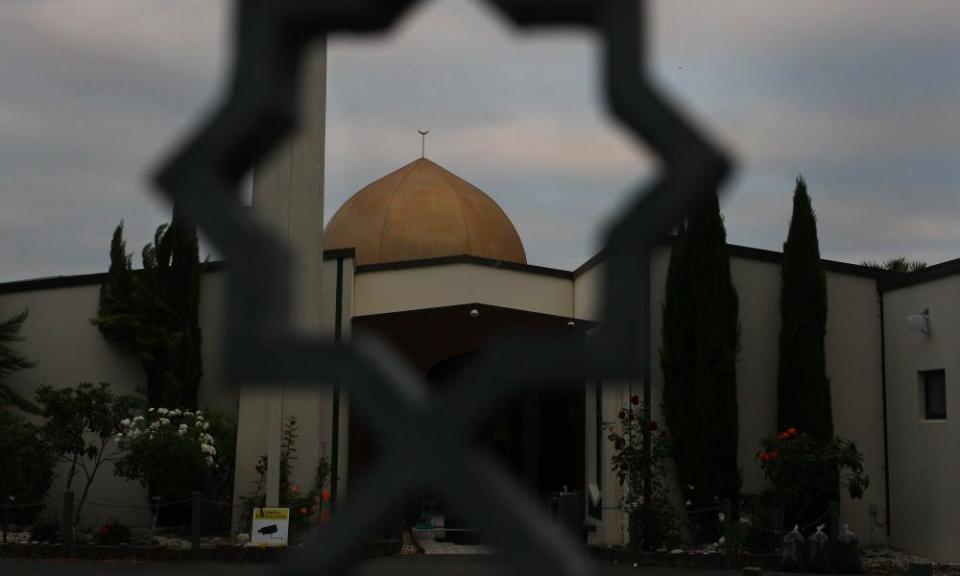Christchurch attack: police 'warned about specific threat planned for day of shootings'

Police in New Zealand were warned about a specific threat to mosques in the country planned for the day that a gunman stormed two places of worship in Christchurch during Friday prayers and killed 51 people, according to evidence given to a closed-door inquiry into whether the attack could have been prevented.
The threat, which appeared on Facebook, to burn a Qur’an outside a New Zealand mosque on 15 March 2019 did not appear to be made by the man guilty of the attacks, the Islamic Women’s Council of New Zealand (IWCNZ) said in its submission to the royal commission into the attack. But the IWCNZ told the panel the police should have been stationed outside mosques that day and that the attack might have been slowed or prevented if they had.
While the group has spoken before about its efforts to raise fears about safety with New Zealand’s government, this is the first time a claim has emerged that the police were told of a separate white supremacist incident planned for the same day as the terrorist attack.
The police had “failed in not developing a national strategy to deal with threats against Muslims and mosques”, the IWCNZ said, and when one of the its members had reported the 15 March threat, the police had initially “dismissed the matter” until she insisted it be followed up.
“If there had been such a strategy, then the message would have alerted every mosque in the country to a threat to one mosque on Friday 15 March 2019 and for all mosques to take extra security measures,” the submission says.
Related: Christchurch gunman pleads guilty to New Zealand mosque attacks that killed 51
The submission, which the Guardian has read in full, lays out how the group desperately tried to raise concerns about the growing threat of far-right white supremacy to the highest levels of government between 2015 and 2019.
Instead, it was ignored, said the IWCNZ, told it was wrong, or was not taken seriously by public servants who sometimes stopped communicating with the council, did not follow up on promised action, or did not keep records of their meetings.
An Australian man who had been radicalised online and amassed a stash of weapons carried out the Christchurch attack – the deadliest shootings in modern New Zealand history – which he broadcast live on Facebook.
The Police said in a statement that it was inappropriate to comment on any submission to the Commission, as it had not concluded. The statement, which was not attributed to a named spokesperson, said officers had identified and formally warned the person who made the threat against mosques in 2019.
The independent inquiry into the shooting is due to report back to New Zealand’s government at the end of July , after which the government will be responsible for releasing the panel’s findings. However, the IWCNZ has chosen to make its submission public ahead of time.
“They’d done everything right, in terms of going to the highest possible people in government,” said Frances Joychild, a lawyer representing the council at the inquiry. “They did all the right things, and the extraordinary thing is that nothing happened.”
Joychild, who has represented claimants in cases against the government for a decade, said she was “sickened” by the way public servants had not heeded the council’s pleas for security.
“They could see a fire about to happen and we had this huge, incompetent inert public service,” she said, adding that there was no way government agencies “could say they didn’t know” about the risk to Muslims in New Zealand. “They did know, they just didn’t care.”
The IWCNZ was represented by three of its leaders – Aliya Danzeisen, Anjum Rahman, and Maysoon Salama, whose son was killed in the attacks. Across hundreds of pages of submissions, the council told the inquiry about the meetings, emails, and exhortations it had made to successive governments.
The trio paid for their own flights and accommodation on trips to New Zealand’s capital to meet MPs and officials, it said, giving presentation after presentation about issues affecting Muslim women, which had included a broad range of matters, until a rising global tide of white supremacy arrived at New Zealand’s shores.
Then, the women said, their entreaties about what they called the “alt-right” grew more urgent. They had solicited meetings with the head of New Zealand’s spy agency and with the country’s minister in charge of the security services, warning that Muslims were being profiled at the expense of the far-right.
They had called for a national strategy to protect the Muslim community, a Muslim advisory group to government agencies, and funding for their work.
“Yet almost nothing was in place by the time of the mosque shootings,” they said in the submission. The group now wants the government to pass hate speech laws, issue an apology to the council and commit to reparations to victims and bereaved families.
Related: Anxious and in pain, survivors of Christchurch massacre call for new approach
The royal commission investigating the attacks has been approached for comment. It was initially due to report back to New Zealand’s government in December 2019, after the prime minister, Jacinda Ardern, promised answers by the end of the year about whether the attack could have been prevented. An April deadline was later pushed to the end of July because of the Covid-19 pandemic.
A spokesman for Ardern said it would be inappropriate for her to comment on the IWCNZ’s submission until the commission had released its full findings.
Brenton Tarrant, the man who pleaded guilty to 51 murders and a terrorism charge, is due to be sentenced at a lengthy hearing in August. He faces life in prison.

 Yahoo News
Yahoo News 